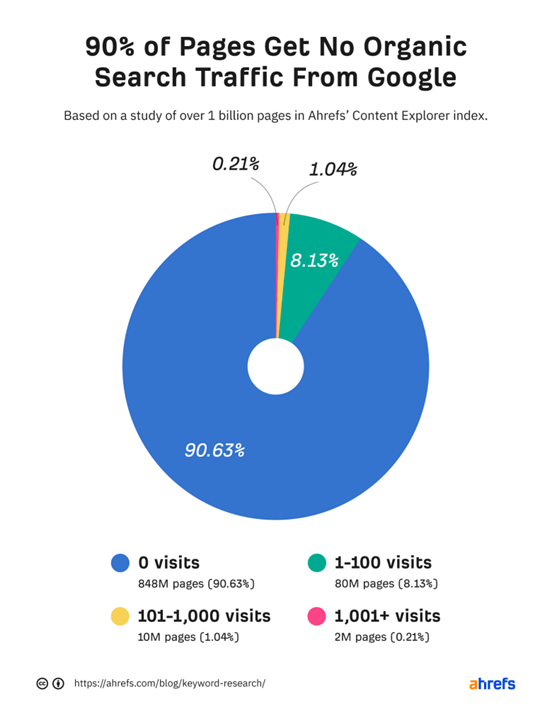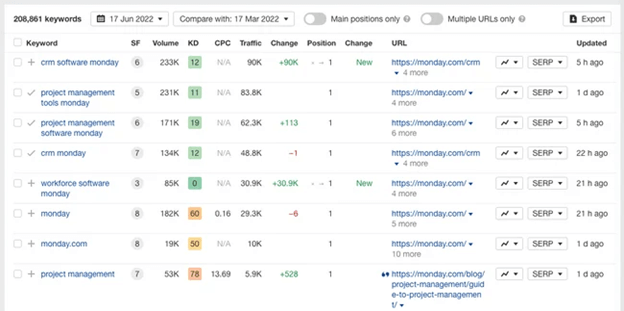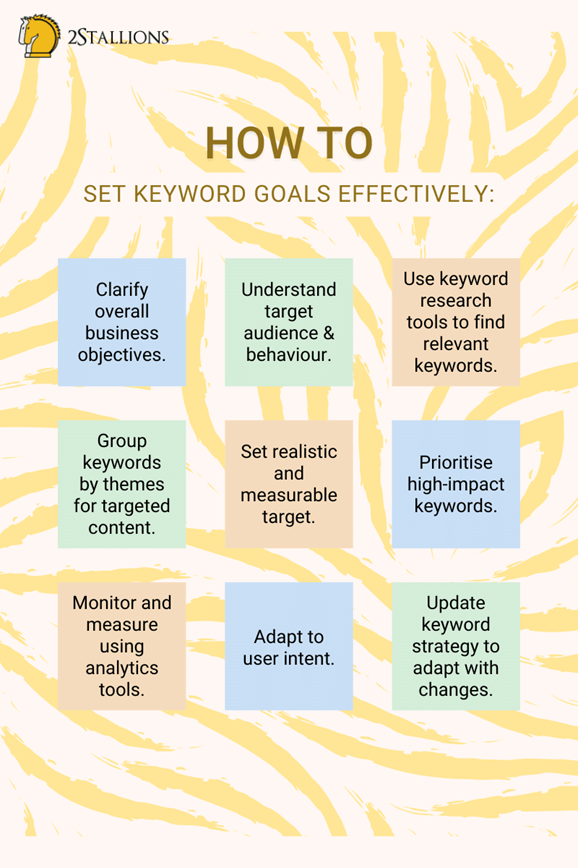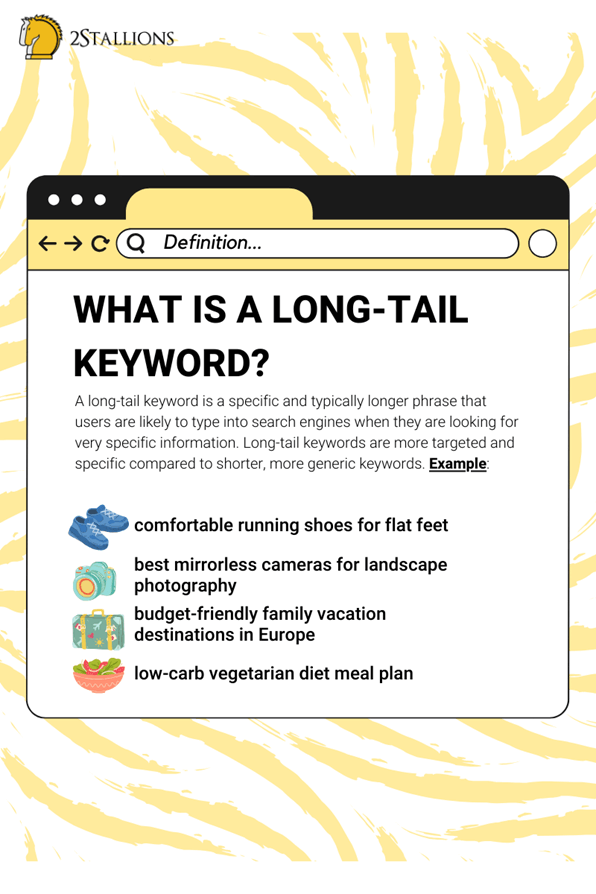SHARE

As a content creator, you know how challenging it can be to get your content noticed online. With millions of websites and blogs vying for attention, ensuring your content is optimised for search engines is crucial. And one of the most fundamental aspects of SEO is keyword research.
Understanding the Importance of Keyword Research
 What is Keyword Research?
What is Keyword Research?
Keyword research is finding and analysing search terms that people enter into search engines. It’s a critical component of SEO because it helps you understand what your target audience is searching for and enables you to create content that aligns with their interests and needs. For instance, if you run a website that sells organic skincare products, you might use keyword research to identify the most popular search terms related to your products, such as “natural skincare,” “vegan skincare,” or “cruelty-free skincare.” By incorporating these keywords into your content, you can increase your visibility in search results and attract more potential customers to your site.
 Why is Keyword Research Crucial for SEO?
Why is Keyword Research Crucial for SEO?
Many website owners make that mistake, and it’s part of why 90.63% of pages on the internet get no traffic from Google, according to a study conducted by Ahrefs. Simply put, keyword research allows you to optimise your content for search engines. Incorporating the right keywords into your content improves your chances of ranking higher in search engine results pages (SERPs) and drives more organic traffic to your website.
However, it’s essential to note that keyword research is not just about stuffing your content with as many keywords as possible. Search engines like Google have become increasingly sophisticated at detecting and penalising “keyword stuffing” tactics, which can harm your SEO efforts in the long run. Instead, focus on using keywords in a natural, strategic way that enhances the value and relevance of your content.
How Keyword Research Affects Your Content Strategy
Keyword research significantly impacts your content strategy. By identifying the right keywords, you can tailor your content to match the needs and interests of your target audience. It also helps you determine the type of content to create, such as blog posts, videos, or infographics, and the topics to cover or avoid. This ensures your content is relevant, engaging, and valuable to your readers.
Moreover, keyword research can help you stay ahead of the competition. By analysing your competitors’ keywords, you can identify gaps in their content strategy and capitalise on opportunities to differentiate yourself and offer unique value to your audience. Overall, keyword research is critical for any business or individual looking to improve their SEO and drive more traffic to their website. By investing time and resources into keyword research, you can gain valuable insights into your target audience and create content that resonates with them, ultimately leading to increased visibility, engagement, and conversions.
Getting Started with Keyword Research
Keyword research is essential to any successful digital marketing strategy. You can create relevant and valuable content by understanding what your target audience is searching for.
Identifying Your Target Audience
The first step in keyword research is identifying your target audience. You need to determine who your ideal customer is, their interests and pain points, and how they search for information online. This will help you create a list of keywords relevant to your niche and audience. For example, if you’re a fitness blogger targeting women over 40, you might want to focus on keywords related to menopause, weight loss, and strength training. By understanding your target audience, you can create content that speaks directly to their needs and interests.
 (Source: HubSpot)
(Source: HubSpot)
Analysing Your Competitors’ Keywords
Another essential aspect of keyword research is analysing your competitors’ keywords. By researching what keywords your competitors are targeting, you can discover new opportunities and identify gaps in your content strategy. This also helps you understand the level of competition for each keyword and determine whether it’s worth targeting. For example, suppose you’re a small business owner competing with larger companies in your industry. In that case, focus on long-tail keywords that are more specific and less competitive. This can help you rank higher in search results and attract more targeted traffic to your website.
 Setting Your Keyword Research Goals
Setting Your Keyword Research Goals
Before you begin your keyword research, you must set your goals. What are you trying to achieve with your content? Are you looking to increase traffic, generate leads, or boost conversions? Clear goals will help you choose the right keywords and tailor your content to meet those objectives. If your goal is to increase traffic to your website, you should focus on high-volume keywords that are popular in your industry. On the other hand, if your goal is to generate leads, you should focus on more specific keywords related to your products or services. Keyword research is crucial to any successful digital marketing strategy. You can create relevant, valuable, and effective content by understanding your target audience, analysing your competitors’ keywords, and setting clear goals.
Tools and Techniques for Effective Keyword Research
Effective keyword research is essential for any successful digital marketing strategy. By identifying the right keywords, you can attract more traffic to your website, increase your brand visibility, and ultimately drive more conversions. Here are some tools and techniques that can help you with your keyword research.
Top Keyword Research Tools
When it comes to keyword research, there are several tools available that can help you identify relevant keywords and analyse their search volume, competition, and other metrics. Some of the most popular keyword research tools include:
Each of these tools has its unique features and benefits, so it’s important to choose the one that best suits your needs and budget.
 (Source: SurfSide PPC)
(Source: SurfSide PPC)
Using Google’s Keyword Planner
Google Keyword Planner is a free tool that helps you find keywords related to your business or industry. It provides valuable insights into search volume, competition, and other important metrics. You can also use it to generate new keyword ideas and estimate the potential traffic for each keyword.
One helpful feature of Google Keyword Planner is the ability to filter keywords by location, language, and device. This can help you tailor your keyword strategy to your target audience and improve the relevance of your content.
Leveraging Google Trends for Keyword Insights
Google Trends is another valuable tool for keyword research. It allows you to see how search trends change over time and compare the popularity of different keywords. This helps you identify emerging trends and adjust your content strategy accordingly.
For example, if you run a fitness blog, you might have noticed that searches for “home workouts” increased during the COVID-19 pandemic. By creating content around this topic, you can tap into this trend and attract more traffic to your website.
 Exploring Long-Tail Keywords
Exploring Long-Tail Keywords
Long-tail keywords are longer, more specific phrases people use to search for information online. They usually have less competition but are highly targeted and more likely to convert. Including long-tail keywords in your content strategy can help you reach a more specific audience and improve your chances of ranking higher in search engine results pages.
For example, instead of targeting the generic keyword “shoes,” you might target a long-tail keyword like “women’s running shoes for flat feet.” This keyword is more specific and targeted, meaning that people searching for it are more likely to be interested in your content and products.
By combining these tools and techniques, you can identify the right keywords for your business and create content that resonates with your target audience. Regularly review and update your keyword strategy to stay ahead of the competition and keep up with changing search trends.
Evaluating and Selecting the Right Keywords
Keywords play a vital role in the success of any online business. They are the words or phrases that people type into search engines when looking for information, products, or services. Choosing the right keywords can help increase your website’s visibility, drive more traffic, and boost your revenue.
Understanding Keyword Metrics
When it comes to evaluating keywords, there are several metrics you need to consider. Search volume is one of the most crucial metrics, which refers to the number of times a keyword is searched for in a given period. The higher the search volume, the more potential traffic a keyword can drive to your website.
However, search volume alone is not enough to determine the value of a keyword. You also need to look at competition and keyword difficulty. Competition refers to the number of other websites targeting the same keyword, while keyword difficulty measures how challenging it is to rank for a particular keyword. Tools like Moz Keyword Explorer or Ahrefs can help you assess these metrics and choose the most suitable keywords for your content.
Assessing Keyword Difficulty
Keyword difficulty is a crucial metric to consider when selecting keywords. High-difficulty keywords are typically more competitive, making it harder to rank for them. On the other hand, low-difficulty keywords may not have enough search volume to drive significant traffic to your website. To assess keyword difficulty, you need to look at several factors, including the quality of existing content, the number of backlinks, and the domain authority of the website’s ranking for the keyword. By analysing these factors, you can determine the level of effort required to rank for a particular keyword.
Balancing Search Volume and Competition
While high search volume keywords may seem desirable, they often come with high competition. It’s essential to balance search volume with competition when selecting keywords. Choose keywords with a reasonable search volume and manageable competition level to maximise your chances of ranking higher in search engine results pages.
It’s also important to consider the intent behind the keyword. Some keywords may have high search volume but may not be relevant to your business or the needs of your target audience. Focusing on keywords that align with your content strategy and the searcher’s intent can help you drive more qualified traffic to your website.
Prioritising Keywords Based on Relevance and Intent
Finally, prioritising keywords is crucial based on their relevance to your business and the searcher’s intent. Choose keywords that align with your content strategy and the needs of your target audience. Creating content that matches the searcher’s intent improves your chances of ranking higher and driving more qualified traffic to your website. Remember, selecting the right keywords is not a one-time process. You need to regularly evaluate and update your keyword strategy to stay ahead of the competition and meet the changing needs of your audience.
Final Thoughts: The Power of Keywords for SEO Success
Keyword research is vital for any content strategy to improve search engine visibility and drive more organic traffic. By understanding your target audience, researching your competitors, and using the right tools and techniques, you can identify relevant keywords and create content that aligns with your audience’s interests and needs. Remember to carefully evaluate and select your keywords, balancing search volume with competition and prioritising relevance and intent. With effective keyword research, you can optimise your content for search engines and achieve better results with your content strategy.
Originally published: 2 June 2023
Updated: 18 December 2023
Increase Your Visibility With Our SEO Services Singapore. Propel Your Brand to the Top. Contact us to amplify your digital presence with expert insight and data-based strategy and conquer the search rankings. Elevate your website today!
Frequently Asked Questions About Keyword Research
”How
Keyword research is absolutely critical for SEO success. It forms the foundation of SEO strategies by identifying the specific terms and phrases users are searching for. By incorporating these keywords strategically into content, websites can enhance online visibility and attract targeted traffic, ultimately improving search engine rankings.
”What
Several tools are highly recommended for effective keyword research. Popular choices include Google Keyword Planner, SEMrush, Ahrefs, and Moz Keyword Explorer. These tools assist in identifying relevant keywords, evaluating competition, and refining a comprehensive keyword strategy, empowering businesses to make data-driven decisions for their SEO efforts.
”How
Keyword research should be regularly updated to stay relevant in dynamic online landscapes. Markets evolve, user behaviours change, and new trends emerge. As a best practice, businesses should conduct keyword research periodically, at least quarterly or whenever significant industry shifts occur. This ensures that SEO strategies remain agile and aligned with current market dynamics.
”What
Long-tail keyword research is crucial in SEO by targeting more specific and niche search queries. While short-tail keywords are broad and competitive, long-tail keywords allow businesses to capture highly targeted and less competitive traffic. Integrating long-tail keywords into content strategies involves creating detailed and informative content that naturally incorporates these specific terms. This approach enhances SEO and provides valuable information for users, improving overall user experience.









